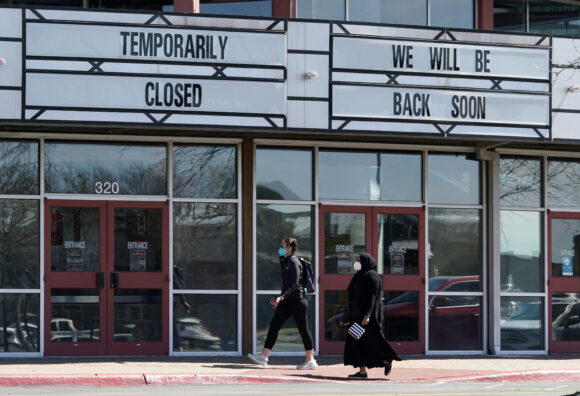The Massachusetts Supreme Judicial Court, in the first state high court ruling on the question, has sided with an insurer and an insurance agency in finding that the COVID-19 losses claimed by three restaurants were not “direct physical loss of or damage to” their property within the meaning of the insurance policies.
The ruling affirms a lower Superior Court ruling that was appealed by restaurant firm Verveine Corp., which operates Coppa in Boston; 1704 Washington LLC, which operates Toro in Boston; and JKFoodGroup LLC, which operates Little Donkey in Cambridge. All three have common ownership and management.
The case is Verveine Corp. v. Strathmore Insurance Co.
No other state supreme court has ruled on the question of whether SARS-CoV-2, the virus that causes COVID-19, can cause a direct physical loss or damage to property, although 10 federal Circuit Courts of Appeal and intermediate appellate courts in California, Illinois, Indiana, Michigan, New York and Ohio have ruled that it cannot, according to a litigation tracker maintained by the University of Pennsylvania’s Carey Law School.
The restaurants purchased their insurance through Commercial Insurance Agency, which arranged their coverage from Strathmore Insurance Co., a subsidiary of Greater New York Mutual Insurance Co. When the pandemic began, the restaurants were covered by two Strathmore property and liability policies — one covering both Toro and Coppa and the other covering Little Donkey.
Commercial Insurance Agency represented to the plaintiffs that the coverage under the policies was the same, but Little Donkey’s policy contained an exclusion for “loss or damage caused by or resulting from any virus, bacterium or other microorganism that induces or is capable of inducing physical distress, illness or disease,” which was not contained in the policy covering Coppa and Toro. The policy covering Coppa and Toro contained an exclusion that was limited to “loss or damage caused directly or indirectly by ‘fungus’, wet rot, dry rot and bacteria” and did not mention viruses.
The plaintiffs’ three restaurants, like many brick-and-mortar businesses, suffered severe reductions in revenues during the pandemic and the resulting government restrictions on public gatherings. They looked to their property insurers to offset these business income losses, but Strathmore denied the claims under both policies, citing the lack of any “physical loss of or damage to” the properties and the virus exclusion to Little Donkey’s policy.
The restaurants then sued the insurer for breach of contract and the insurance broker for allegedly negligently failing to procure policies that would have covered damages resulting from the COVID-19 virus.
Holding that the insurance policies in question “unambiguously” did not cover the plaintiffs’ losses, a Superior Court judge granted Strathmore’s motion to dismiss and Commercial’s motion for judgment on the pleadings.
The Supreme Judicial Court then took up the matter on appeal.
The ruling extends the winning record of insurers in COVID-19 business cases. According to an analysis on ClamsJournal.com by Hinshaw & Culbertson law firm, at the trial court level, insurers have prevailed in more than 78 percent of the 194 rulings on motions to dismiss in state courts and in more than 95 percent of the 598 rulings by federal courts. Also, insurers have won, on the merits, in every appellate court decision thus far in both federal and state court.
In this Massachusetts case, the restaurants’ insurance policies define covered causes of loss as risks of direct physical loss, subject to certain exclusions and limitations. The plaintiffs allege that the policies were “marketed and sold” as “all-risk” policies. But the court said the relevant question is what the terms of the policies themselves say.
“Even if we were to inquire into the expectations of the insured, the focus is on what an insured ‘reading the relevant policy language, would expect to be covered,’ not the insured’s more general perceptions of the policy,” the court noted, adding that the burden remains on the insured to demonstrate that such loss or damage, within the meaning of the policy, actually occurred.
After reviewing the language in the policies, the state’s top court found that the question is whether there was any “direct physical loss of or damage to property” at the restaurants. It concluded that “no reasonable interpretation of direct physical loss of or damage to property supports the plaintiffs’ claims.”
Even accepting the plaintiffs’ premise that the suspension of their business was caused by the “presence” of the virus on surfaces and in the air at the restaurants, mere “presence” does not amount to loss or damage to the property, the court added.
The high court also affirmed the dismissal of the claims against Commercial Insurance Agency over the exclusion, finding that Little Donkey failed to recover from Strathmore because coverage did not attach in the first place, not because of the virus exclusion.
Amicus briefs were submitted by the Massachusetts Insurance and Reinsurance Bar Association; by the American Property Casualty Insurance Association, the National Association of Mutual Insurance Companies, and the Massachusetts Insurance Federation; by Amphenol Corp. and Lawrence General Hospital; by United Policyholders; and by American Food Systems, Inc.
Was this article valuable?
Here are more articles you may enjoy.


 LA County Told to Pause $4B in Abuse Payouts as DA Probes Fraud Claims
LA County Told to Pause $4B in Abuse Payouts as DA Probes Fraud Claims  US Will Test Infant Formula to See If Botulism Is Wider Risk
US Will Test Infant Formula to See If Botulism Is Wider Risk  Elon Musk Alone Can’t Explain Tesla’s Owner Exodus
Elon Musk Alone Can’t Explain Tesla’s Owner Exodus  Credit Suisse Nazi Probe Reveals Fresh SS Ties, Senator Says
Credit Suisse Nazi Probe Reveals Fresh SS Ties, Senator Says 